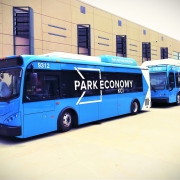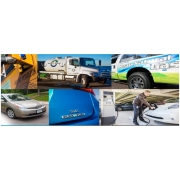Kansas City, Kansas Public Schools takes on green hue
Kansas City, Kansas Public Schools takes on green hue
By Jerry LaMartina
Metropolitan Energy Center, freelance writer
The spring of 2011 looked especially green for the Kansas City, Kansas Public Schools.
That’s when the school district put into service 47 new school buses fueled by compressed natural gas (CNG), a CNG fueling station and four hybrid-electric minibuses. These alternative-fuel buses displace about 24,000 gallons of diesel fuel a year.
The project is thought to be the biggest CNG deployment ever by a Midwestern school district, and it puts the district’s roughly 165-bus fleet at 31 percent CNG.
KCKPS took this step toward going green by spending $8.4 million on the project, and it was reimbursed with $3.6 million from a $15 million U.S. Department of Energy (DOE) Clean Cities grant awarded in December 2009. The overall grant also benefited several other municipalities and companies in the Kansas City area and elsewhere that had implemented alternative-fuels projects. Kansas City-based Metropolitan Energy Center (MEC) administered the entire grant through a contract with the DOE. All the projects supported by the grant constitute MEC’s Midwest Region Alternative Fuels Project.
George Taylor is former director of transportation for KCKPS, a job he held from 1999 to mid-2013. Taylor had to crack the books to bring the project to fruition.
“I spent probably three years in preparation for this, educating myself and exploring grant opportunities,” he says. “Several grant applications were rejected.
Before I made the applications, I had to educate the board of education and the assistant superintendent of business services. After it was awarded, I spent another year educating them on the benefits of CNG.
“It was a pretty easy sell.”
Taylor says he had to be “very proactive in every phase of the project.”
“My reputation was on the line if this didn’t work or wasn’t successful,” he says. “During my tenure, it was an excellent choice. It was an excellent program. We had little problems, but they were nothing but a little blip on the radar. Otherwise, it worked flawlessly.”
Taylor gets calls from people who are interested in switching to CNG-fueled vehicles.
“They see the savings and they latch onto that,” he says. “They think that with one phone call with me they’ll get everything they need to know. I tell them first of all you need to get yourself educated about CNG, slow-fill or fast-fill station, do your fleet all at once or in smaller numbers. They need to begin educating the people who have the purse strings. The reliability of the equipment you want to use. Give them the ability to support you in doing this.”
Taylor says the reasons for embracing alternative fuels are “to secure energy independence for the nation, and to save money for the school districts.”
“It allows districts to put that money into educating in the classroom. Also, very important to the community and the student population is the environmental impact.”
* * *
lamartina.jerry@gmail.com



